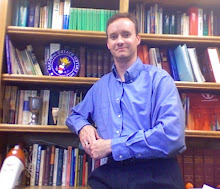SBL Annual Meeting Presentation
The preliminary program book is online for the annual meeting of the Society of Biblical Literature in Atlanta. I will be presenting some of my dissertation findings in a synoptics section:
Synoptic Gospels
11/21/2010
4:00 PM to 6:30 PM
Theme: Revisiting Classic Interpretations
Robert Derrenbacker, Thorneloe University, Presiding
Peter Wick, Ruhr-University of Bochum
The Unspeakable Mysterion in Mark and the Unveiled Mysteria in Matthew and Luke (30 min)
Jason Robert Combs, University of North Carolina at Chapel Hill
Jewish 'Fools' and their Gentile Foil: Reading Comedy in Mark 15:34-39 (30 min)
Rebekah Eklund, Duke University
The Identity of the Crowds in the Passion Narrative (30 min)
Elizabeth E. Shively, Gordon-Conwell Theological Seminary
A Tale of Two Households: Mark 3:22-30 and 13:32-37 (30 min)
Joseph Weaks, Brite Divinity School
Reconstructing Mark: Problems With Getting Behind the Text (30 min)
Here's the abstract:
Reconstructing Mark: Problems With Getting Behind the Text
In Synoptic Studies, often the examination of a pericope includes our attempts to get behind the text. We rely upon standard criteria for reconstructing source texts. However, we need to improve our capability to assess the reliability of a text that has been reconstructed from potentially independent witnesses that used it as a source. For example, how well could we reconstruct Mark based upon its use in Matthew and Luke? This paper will survey the findings of a dissertation which established a complete reconstruction of Mark from the evidence in Matthew and Luke. The results come from structural analysis and a comparative stylographic statistical comparison between the fully reconstructed Mark and the canonical text of Mark. Assessing what is lost in the reconstruction, what is introduced, and what is changed in relation to canonical Mark helps us understand the limitations of source analysis within the Synoptic gospels. Among the findings is the recognition that a reconstructed text will not reflect many of the dominant features of its predecessor, and likewise, a reconstructed text will bear features unique to its form that have no relevance to the original text it approximates. These findings point to strong implications for how we assess the primitivity of one tradition against another, the presumptions made regarding an underlying textual form of a given pericoope, as well as the reliability of the text of a reconstructed Q source as it is used in other historical inquiry into early Christianity.

2 comments:
Joe, hello!
Is your dissertation finished?
I was always fascinated with the idea of reconstructing Mark, but never had the time to delve into this myself.
I really would love to read your thesis!
Write to me at wie@uni-bremen.de
Ah, I found the dissertation online. Thanks!
Looking forward to reading it!
Post a Comment